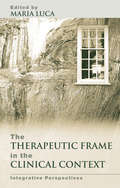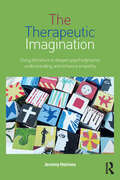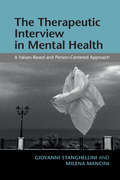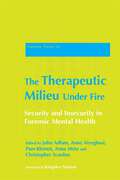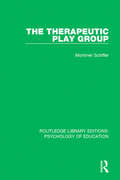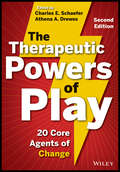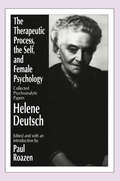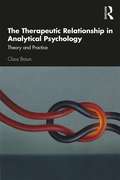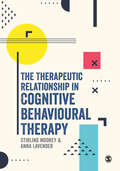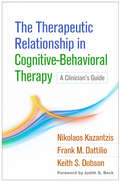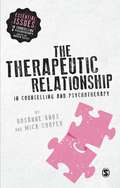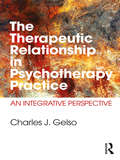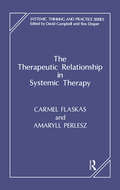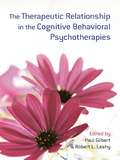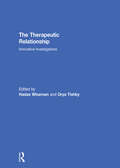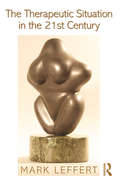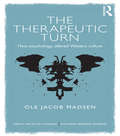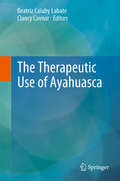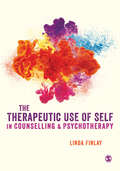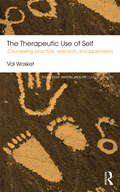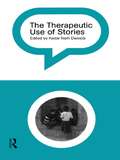- Table View
- List View
The Therapeutic Frame in the Clinical Context: Integrative Perspectives
by Maria LucaHow does the therapeutic frame help therapists in their practice? The Therapeutic Frame in the Clinical Context examines some of the key issues inherent in the intimate and very often intense therapeutic relationship. It addresses and clarifies perspectives on the creation of a therapeutic environment that is conducive to therapy. The book addresses specific aspects of the therapeutic frame. How does a client feel about unexpectedly meeting her psychotherapist's son or daughter? How does a psychotherapist or counsellor practice within a 'frameless', often intrusive environment, in acute hospital wards? How does a counsellor manage the frame in the face of a life-threatening illness? Using a wealth of examples from clinical practice, The Therapeutic Frame in the Clinical Context examines these issues and more, in a range of settings including the NHS, private practice, and the workplace, and provides valuable guidelines from a range of theoretical perspectives, including Jungian and psychoanalytic.
The Therapeutic Imagination: Using literature to deepen psychodynamic understanding and enhance empathy
by Jeremy HolmesUse of the imagination is a key aspect of successful psychotherapeutic treatments. Psychotherapy helps clients get in touch with, awaken, and learn to trust their creative inner life, while therapists use their imaginations to mentalise the suffering other and to trace the unconscious stirrings evoked by the intimacy of the consulting room. Working from this premise, in The Therapeutic Imagination Jeremy Holmes argues unashamedly that literate therapists make better therapists. Drawing on psychoanalytic and literary traditions both classical and contemporary, Part I shows how poetry and novels help foster therapists’ understanding of their own imagination-in-action, anatomised into five phases: attachment, reverie, logos, action and reflection. Part II uses the contrast between secure and insecure narrative styles in attachment theory and relates these to literary storytelling and the transformational aspects of therapy. Part III uses literary accounts to illuminate the psychiatric conditions of narcissism, anxiety, splitting and bereavement. Based on Forster’s motto, ‘Only Connect’, Part IV argues, with the help of poetic examples, that a psychiatry shorn of psychodynamic creativity is impoverished and fails to serve its patients. Clearly and elegantly written, and drawing on the author’s deep knowledge of psychoanalysis and attachment theory and a lifetime of clinical experience, Holmes convincingly links the literary and psychoanalytic canon. The Therapeutic Imagination is a compelling and insightful work that will strike chords for therapists, counsellors, psychoanalysts, psychiatrists and psychologists.
The Therapeutic Interview in Mental Health: A Values-Based and Person-Centered Approach
by Giovanni Stanghellini Milena ManciniEmotions and values are considered the keys to understanding peoples' experiences and actions within the world they inhabit. The traditional symptom-led clinical interview is frequently criticised for ignoring the narrative of a patient's experience in favour of ticking-off symptoms that can be reduced or controlled. In response, this important new book seeks to understand a patient's sufferings through their individual experiences and values. The Therapeutic Interview in Mental Health is about the art of asking questions. This comprehensive book will equip psychologists, psychiatrists and clinicians with the tools to begin unlocking the emotions and experiences of their patients. The method of the therapeutic interview is explained in a step-by-step way, allowing the reader to understand the clinical interview as a means of beginning a shared understanding between patient and clinician. This book is an essential read for all psychologists, psychiatrists, general clinicians, and medical trainees.
The Therapeutic Milieu Under Fire: Security and Insecurity in Forensic Mental Health
by Jonathan Coe Gwen Adshead Rebecca Neeld Estela Welldon Kingsley Norton Tom Clarke Scanlon Christopher Aiyegbusi Anne Celia Taylor Christopher Scanlon John Adlam Andrew Cooper Martin Wrench Anna Motz Motz Anna Valerie Sinason Alan Corbett Anne Aiyegbusi Earl Hopper Pam KleinotThis groundbreaking book explores the psychodynamics and socio-politics of the forensic therapeutic milieu, addressing some of the most difficult and complex issues facing practitioners. It sets out a psycho-social framework for understanding the predicament and the needs of those who live in and those who work in forensic mental health settings. It brings to life the thinking of those working on the frontline in an increasingly difficult and hostile environment, and draws together fresh and stimulating approaches to engagement with highly complex individuals who present challenges to traditional models of psychiatric assessment and treatment. Contributors with considerable clinical experience and expertise from a range of disciplines consider the ethical, emotional and intellectual challenges of their work, and describe ways in which genuine containment and change can be achieved despite numerous perceived assaults on therapeutic relationships, and on the therapeutic milieu itself. Combining clinical case studies with organisational perspectives and clear descriptions of theoretical processes, they explore key issues including the challenges of maintaining role-appropriate, 'boundaried' relationships; the tensions between public protection and individual confidentiality; questions of risk and responsibility; duty of care and respect for individual liberty; the challenges posed by inter-professional tensions and rivalries; as well as specific clinical dilemmas. The difficulties they experience in fulfilling specific therapeutic roles in the face of uncertainties about the funding and commissioning of their services are addressed, and the final part of the book outlines some of the ways in which individuals, particular services and whole organisations may protect themselves when under attack. This unique and highly original book is essential reading for all those working, or training to work, in both forensic and non-forensic inpatient therapeutic milieux and for academics and lay readers interested in the societal dynamics of inclusion and exclusion that are replicated and magnified in these settings.
The Therapeutic Play Group (Routledge Library Editions: Psychology of Education)
by Mortimer SchifferOriginally published in 1971, this title is a comprehensive and detailed presentation of the principles and practices of an activity-type, experimental form of group therapy which had proved successful with emotionally disturbed, pre-pubertal children at the time. Mortimer Schiffer describes the clinical procedures and rehabilitative programs that were developed, over a period of many years, through experience of more than a hundred therapeutic play groups. One play group, conducted in a public elementary school in an underprivileged community of a large city, is examined from its inception to its termination after more than three years of meetings. Thus the reader is able to study the psycho-dynamics of a group, and to appreciate the special meaning of the school environment when it is used as a setting for therapeutic group practice. As the author says, "The school is not only advantageously situated with respect to the identification of developmental problems in young children, but it also has great potential for carrying out preventive and rehabilitative programs. No other community resource – including the mental health agencies – can match the potential of school-based programs for countering mal-experience in the lives of children." This book will be of interest to psychiatrists, social workers and psychologists who work with emotionally disturbed children, and also to teachers in special education and to other school personnel involved with children who have adjustment problems.
The Therapeutic Powers of Play
by Charles E. Schaefer Athena A. Drewes"Focusing on the specific ingredients that activate clinical change, this book is enhanced by current research, more ample scope, and an array of contributions in contemporary and relevant topic areas. It is full of inspiration, direction, and grounding. This is a stunning contribution to the field of child therapy."-Eliana Gil, PhD, Gil Institute for Trauma Recovery and EducationA practical look at how play therapy can promote mental health wellness in children and adolescentsRevised and expanded, The Therapeutic Powers of Play, Second Edition explores the powerful effects that play therapy has on different areas within a child or adolescent's life: communication, emotion regulation, relationship enhancement, and personal strengths. Editors Charles Schaefer and Athena Drewes-renowned experts in the field of play therapy-discuss the different interventions and components of treatment that can move clients to change.Leading play therapists contributed to this volume, supplying a wide repertoire of practical techniques and applications in each chapter for use in clinical practice, including:Direct teachingIndirect teachingSelf-expressionRelationship enhancementAttachment formationCatharsisStress inoculationCreative problem solvingSelf-esteemFilled with clinical case vignettes from various theoretical viewpoints, the second edition is an invaluable resource for play and child therapists of all levels of experience and theoretical orientations.
The Therapeutic Process, the Self, and Female Psychology: Collected Psychoanalytic Papers
by Helene DeutschHelene Deutsch was one of the most famous psychoanalysts to emerge from Freud's immediate circle in Vienna. Best known for her writings on female psychology, she was also one of the great teachers of psychoanalysis. As the founding president of the Vienna Psychoanalytic Training Institute, she confirmed her stature in the history of psychoanalysis by cultivating a whole younger generation of influential analysts. Deutsch was tolerant and open-minded, both as a theoretician and teacher, but, as Paul Roazen remarks in his introduction, independence and an absence of fanaticism can mean a temporary fading out of influence. For the first time, Deutsch's major professional contributions are brought together for permanent consideration. This volume documents her enduringly valuable exploration of the complexities of the psychology of women's experience.Deutsch remained essentially faithful to the Freudian canon. Nonetheless, and throughout these writings, she developed ideas on the subject of femininity that were often at odds with those of her mentor. Her use of Freud's theories aimed to encourage toleration of human diversity and to modify his model of sexuality according to the particular circumstances of women's lives. It was Deutsch who introduced motherhood as a central concern of psychoanalysis by stressing how the psychological dimension of reproduction was different for men and women and how this uniquely feminine capacity had its effects on the entire psychology of women.The same commitment to human diversity informs her much-misunderstood work on the clinical problems of female sexual dysfunction. While accepting the Freudian goal of sexual gratification, Deutsch argues that sublimation through work was a key value in its own right This is illustrated in "George Sand: A Woman's Destiny," a brilliant early example of psychobiography. This volume of Deutsch's classic papers, several appearing in English for the first time, will be of interest to psychologists, intellectual historians, and women's studies specialists.
The Therapeutic Relationship in Analytical Psychology: Theory and Practice
by Claus BraunIn The Therapeutic Relationship in Analytical Psychology: Theory and Practice Claus Braun presents a thorough exploration of the importance of the therapeutic relationship and explains how to encourage and develop it. Drawing on Braun’s decades of clinical experience, the book clearly demonstrates the significance of establishing an intensive and living connection between client and analyst. The book examines the crucial steps of the psychotherapeutic process, illustrated with a detailed case study that presents the personal development of an analysand through a series of dreams and drawings. Braun connects key concepts in analytical psychology, such as complexes, symbols, archetypes and amplification, with conscious and unconscious processes and the development of the therapeutic relationship during the analytic process. The book also examines why C. G. Jung put such a special emphasis on the therapeutic relationship and explores the ethical demands and social responsibilities of the analyst. Comprehensive and insightful, it skillfully makes the connection between Jung’s analytical psychology and practical psychotherapeutic work. The Therapeutic Relationship in Analytical Psychology will be an essential text for Jungian analysts and psychotherapists in practice and in training and a key reference for academics and students of analytical psychology, psychotherapy and Jungian studies.
The Therapeutic Relationship in Cognitive Behavioural Therapy
by Stirling Moorey Anna LavenderThe therapeutic relationship in CBT is often reduced to a cursory description of establishing warmth, genuineness and empathy in order to foster a collaborative relationship. This does not reflect the different approaches needed to establish a therapeutic partnership for the wide range of disorders and settings in which CBT is applied. This book takes a client group and disorder approach with chapters split into four sections: General issues in the therapeutic relationship in CBT Therapeutic relationship issues in specific disorders Working with specific client groups Interpersonal considerations in particular delivery situations Each chapter outlines key challenges therapists face in a specific context, how to predict and prevent ruptures in the therapeutic alliance and how to work with these ruptures when they occur. With clinical vignettes, dialogue examples and ‘tips for therapists' this book is key reading for CBT therapists at all levels.
The Therapeutic Relationship in Cognitive Behavioural Therapy
by Stirling Moorey Anna LavenderThe therapeutic relationship in CBT is often reduced to a cursory description of establishing warmth, genuineness and empathy in order to foster a collaborative relationship. This does not reflect the different approaches needed to establish a therapeutic partnership for the wide range of disorders and settings in which CBT is applied. This book takes a client group and disorder approach with chapters split into four sections: General issues in the therapeutic relationship in CBT Therapeutic relationship issues in specific disorders Working with specific client groups Interpersonal considerations in particular delivery situations Each chapter outlines key challenges therapists face in a specific context, how to predict and prevent ruptures in the therapeutic alliance and how to work with these ruptures when they occur. With clinical vignettes, dialogue examples and ‘tips for therapists′ this book is key reading for CBT therapists at all levels.
The Therapeutic Relationship in Cognitive-Behavioral Therapy: A Clinician's Guide
by Judith S. Beck Nikolaos Kazantzis Frank M. Dattilio Keith S. DobsonFrom leading cognitive-behavioral therapy (CBT) experts, this book describes ways to tailor empirically supported relationship factors that can strengthen collaboration, empiricism, and Socratic dialogue and improve outcomes. In an accessible style, it provides practical clinical recommendations accompanied by rich case examples and self-reflection exercises. The book shows how to use a strong case conceptualization to decide when to target relationship issues, what specific strategies to use (for example, expressing empathy or requesting client feedback), and how to navigate the therapist's own emotional responses in session. Special topics include enhancing the therapeutic relationship with couples, families, groups, and children and adolescents. Reproducible worksheets can be downloaded and printed in a convenient 8 1/2" x 11" size.
The Therapeutic Relationship in Counselling and Psychotherapy (Essential Issues in Counselling and Psychotherapy - Andrew Reeves)
by Mick Cooper Rosanne KnoxWhat is a therapeutic alliance? How do I create a bond? What might lead to the alliance breaking down? What do I do when the relationship feels stuck? These are just some of the questions addressed in this important new book for trainee and qualified therapists wanting to understand, engage in and make the most of the therapeutic relationship. Taking you through each stage of the therapeutic process, from initial boundary setting to effective endings, the book considers a number of different settings and client groups such as working in an online environment and with children and young people. Structured around ‘Frequently Asked Questions’, an accessible and engaging narrative guides you though the skills and considerations for an effective therapeutic relationship, as well as the potential challenges it might face. Bringing to the forefront the mutuality of the relationship and the client as a proactive agent, this book will equip you with the knowledge and skills needed to develop trusting and productive relationships with your clients.
The Therapeutic Relationship in Counselling and Psychotherapy (Essential Issues in Counselling and Psychotherapy - Andrew Reeves)
by Professor Mick Cooper Rosanne KnoxUnravelling the issues surrounding the therapeutic relationship, this book highlights the importance of the relationship itself, of the client as a proactive agent in the process, and of the need for partnership and collaboration for effective therapy to take place. It will provide trainees and newly qualified therapists with the knowledge and skills they need to practice on a level of deep understanding and confidence.
The Therapeutic Relationship in Psychotherapy Practice: An Integrative Perspective
by Charles J. GelsoThe Therapeutic Relationship in Psychotherapy Practice: An Integrative Perspective explores the key components of the patient–therapist relationship in psychotherapy, as well as how these elements affect the treatment process and outcomes and what therapists may do to enhance the relationship. Dr. Gelso posits a tripartite model in which the therapeutic relationship is seen as being composed of three interlocking elements: a real or personal relationship, a working alliance, and a transference–countertransference configuration that exist in each and every therapeutic relationship. Focusing on what psychotherapists can do to foster strong and facilitative relationships with their patients, the book includes substantial material drawn from clinical practice, with an ever-present eye on research findings.
The Therapeutic Relationship in Systemic Therapy (The Systemic Thinking and Practice Series)
by Carmel Flaskas Amaryll Perlesz Eleanor S. WertheimAnyone following the recent developments of systemic thinking will be aware that activity has not been restricted to Europe and America. Systemic therapists and writers from both Australia and New Zealand are now making a major impact on the field, particularly in the way they explore therapy as an exchange between “real” people; with gender and with ethical values; and embedded within specific cultural experiences. These people are challenging the traditional way we see clients and the context of therapy. Over the years, systemic? therapists have theorized extensively about the client family as a system and have more recently addressed the use of self in therapy, but there has been very little attention paid to the therapeutic relationship between the two.
The Therapeutic Relationship in the Cognitive Behavioral Psychotherapies
by Robert L. Leahy Paul GilbertAlthough the therapeutic relationship is a major contributor to therapeutic outcomes, the cognitive behavioral psychotherapies have not explored this aspect in any detail. This book addresses this shortfall and explores the therapeutic relationship from a range of different perspectives within cognitive behavioral and emotion focused therapy traditions. The Therapeutic Relationship in the Cognitive Behavioral Psychotherapies covers new research on basic models of the process of the therapeutic relationship, and explores key issues related to developing emotional sensitivity, empathic understanding, mindfulness, compassion and validation within the therapeutic relationship. The contributors draw on their extensive experience in different schools of cognitive behavioral therapy to address their understanding and use of the therapeutic relationship. Subjects covered include: · the process and changing nature of the therapeutic relationship over time · recognizing and resolving ruptures in the therapeutic alliance · the role of evolved social needs and compassion in the therapeutic relationship · the therapeutic relationship with difficult to engage clients · self and self-reflection in the therapeutic relationship. This book will be of great interest to all psychotherapists who want to deepen their understanding of the therapeutic relationship, especially those who wish to follow cognitive behavioral approaches.
The Therapeutic Relationship: Innovative Investigations
by Hadas Wiseman and Orya TishbyThe therapeutic relationship has been recognized by psychotherapy researchers and clinicians alike as playing a central role in the process and outcome of psychotherapy. This book presents innovative investigations of the therapeutic relationship focusing on various relationship mechanisms as they relate to changing processes and outcomes. A variety of perspectives on the therapeutic relationship are provided through different research methods, including quantitative and qualitative methods, and divergence in psychotherapy orientations, including psychodynamic, interpersonal, cognitive-behavioural therapy, emotion-focused process experiential therapy, narrative therapy, and attachment-based family therapy. The chapters, written by leading psychotherapy researchers, present cutting-edge empirical studies that apply innovative methods in order to: study process-outcome links; explore in session processes that address the question of how the therapeutic relationship heals; examine the contributions of clients and therapists to the therapeutic relationship; and suggest practical implications for training therapists in psychotherapy relationships that work. Research on the therapeutic relationship has been identified as a natural arena for bridging the gap between research and clinical practice, and will be of particular interest to practicing clinicians. This book was originally published as a special issue of Psychotherapy Research.
The Therapeutic Situation in the 21st Century
by Mark LeffertExtending the themes of Contemporary Psychoanalytic Foundations, The Therapeutic Situation in the 21st Century is a systematic reformulation of fundamental psychoanalytic concepts, such as transference, therapeutic action, and the uses of psychotropic drugs, in the light of recent developments in postmodernism, complexity theory, and neuroscience. Leffert offers formulations of areas not previously considered in any depth by psychoanalysts, such as power relations in the analytic couple, social matrix theory, and narrative theory informed by considerations of archaeology, genealogy, complexity, memory, and recall. He also considers new areas, such as the role of uncertainty and love in the therapeutic situation. This book is part of an ongoing effort to place psychoanalysis in the current century, and looks to outside as well as inside areas of thought to inform how we work and how we think about our work.
The Therapeutic Turn: How psychology altered Western culture (Concepts for Critical Psychology)
by Ole Jacob MadsenIn what ways has psychology become more influential in Western society? In this book author Ole Jacob Madsen considers the notion of a ‘Therapeutic Turn’ in Western culture – the tendency for psychology to permeate ever new spheres within society. The Therapeutic Turn evaluates the increasing prevalence of psychology in several areas of Western society: Western consumer culture, contemporary Christianity, self-help, sport and politics. Madsen proposes that there are problematic aspects to this development which are seldom recognised due to a widely held assumption that ‘the more psychology, the better for everyone’. A recurring concern with psychological solutions is that they often provide individual solutions to structural problems. As a result, psychologists may be inadvertently increasing the burden on the shoulders of the people they are meant to help and, at the same time, our capacity to understand individual suffering in the light of major historical and political changes in society is becoming increasingly clouded. The Therapeutic Turn presents an accessible and engaging critique of the influence of psychology within Western society. It will appeal to a broad audience of students, academics and lay readers interested in this aspect of modernity and contemporary society, and it will also be of great interest to practitioners and therapists.
The Therapeutic Use of Ayahuasca
by Beatriz Caiuby Labate Clancy CavnarThis book presents a series of perspectives on the therapeutic potential of the ritual and clinical use of the Amazonian hallucinogenic brew ayahuasca in the treatment and management of various diseases and ailments, especially its role in psychological well-being and substance dependence. Biomedical and anthropological data on the use of ayahuasca for treating depression, PTSD, and substance dependence in different settings, such as indigenous contexts, neo-shamanic rituals, contemporary therapeutic circles, and in ayahuasca religions, in both South and North America, are presented and critiqued. Though multiple anecdotal reports on the therapeutic use of ayahuasca exist, there has been no systematic and dense reflection on the topic thus far. The book brings the therapeutic use of ayahuasca to a new level of public examination and academic debate. The texts in this volume stimulate discussion on methodological, ethical, and political aspects of research and will enhance the development of this emergent field of studies.
The Therapeutic Use of Ayahuasca
by Beatriz Caiuby Labate Clancy CavnarThis book presents a series of perspectives on the therapeutic potential of the ritual and clinical use of the Amazonian hallucinogenic brew ayahuasca in the treatment and management of various diseases and ailments, especially its role in psychological well-being and substance dependence. Biomedical and anthropological data on the use of ayahuasca for treating depression, PTSD, and substance dependence in different settings, such as indigenous contexts, neo-shamanic rituals, contemporary therapeutic circles, and in ayahuasca religions, in both South and North America, are presented and critiqued. Though multiple anecdotal reports on the therapeutic use of ayahuasca exist, there has been no systematic and dense reflection on the topic thus far. The book brings the therapeutic use of ayahuasca to a new level of public examination and academic debate. The texts in this volume stimulate discussion on methodological, ethical, and political aspects of research and will enhance the development of this emergent field of studies.
The Therapeutic Use of Self in Counselling and Psychotherapy
by Linda FinlayThis book examines the ‘therapeutic use of self’, and the intertwining of the therapist’s professional self and their personal self. Combining practical illustrations and case studies with theory and research, the book explores a number of questions, such as: · What are our personal values and attitudes and how do these manifest in our work with clients? · How do we interact with and impact others, and in what ways might this help or hinder our therapeutic work? · What might we represent to the client as a result of our particular social background, and how might this impact on the power dynamics within client relationships? Learning features include Practical Applications, Research boxes, Case Examples, Critical Reflections, Discussion Questions and Further Reading. This is a must-read for any students studying professional practice, counselling process, ethics, skills, working online/remotely, the therapeutic relationship, and more.
The Therapeutic Use of Self in Counselling and Psychotherapy
by Linda FinlayThis book examines the ‘therapeutic use of self’, and the intertwining of the therapist’s professional self and their personal self. Combining practical illustrations and case studies with theory and research, the book explores a number of questions, such as: · What are our personal values and attitudes and how do these manifest in our work with clients? · How do we interact with and impact others, and in what ways might this help or hinder our therapeutic work? · What might we represent to the client as a result of our particular social background, and how might this impact on the power dynamics within client relationships? Learning features include Practical Applications, Research boxes, Case Examples, Critical Reflections, Discussion Questions and Further Reading. This is a must-read for any students studying professional practice, counselling process, ethics, skills, working online/remotely, the therapeutic relationship, and more.
The Therapeutic Use of Self: Counselling practice, research and supervision (Routledge Mental Health Classic Editions)
by Val WosketThe Therapeutic Use of Self has continued, since its publication in 1999, to be considered a key text within integrative, humanistic and relational approaches for the training and development of therapists in the UK and abroad. This long-awaited classic edition includes powerful case examples and extensive research findings, presenting the counsellor’s evaluation of their own practice as the main vehicle for the development of insight and awareness into individual ‘therapeutic’ characteristics. The book addresses many of the taboos and infrequently discussed aspects of therapy, such as: The value of therapist failure Breaking the rules of counselling Working beyond the accepted boundaries of counselling. The Therapeutic Use of Self will help professionals and trainees acknowledge, develop and value their own unique contribution to counselling and psychotherapy. The book remains a ground-breaking examination of the individual therapist’s contribution to process and outcome in counselling and supervision.
The Therapeutic Use of Stories
by Kedar Nath DwivediThe potential for healing available in well-known myths and stories is increasingly recognized, but many practitioners are unsure how to tap into this rich and often culturally-specific source of insight. What sort of story is best for what sort of situation? How can it be introduced naturally into the session? What is the best way of using the story? These are some of the questions contributors to this book set out to answer. They explore the historical and cultural context of story-telling and provide examples of specific stories for specific situations. Covering emotional themes such as anger, anxiety, fear, shame, guilt, separation and bereavement, the authors show how they work through stories with many different kinds of client groups and individuals of all ages in educational, health and social science settings. The Therapeutic Use of Stories provides a sound theoretical framework for the use of stories, examples of stories with a high therapeutic value, and practical advice on how to use them to best effect.
